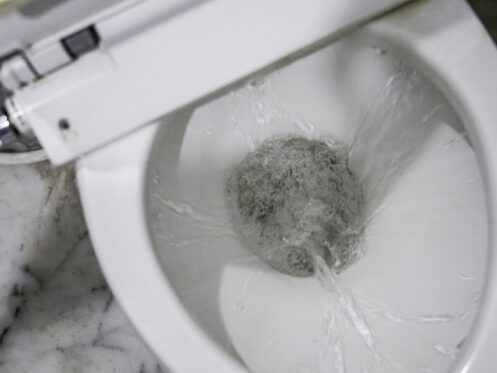One large part of caring for the plumbing system in your Vacaville, CA home is knowing what not to flush down your commodes. Although most consumers already know that paper towels can prove problematic, products that are marketed as “flushable” cause a fair amount of confusion. While flushable, personal care wipes can certainly be sent down your toilets, this doesn’t mean that they should. Despite their misleading labeling and marketing, these products wreak havoc on pipes, municipal sewer systems, and more. Unlike toilet paper, flushable wipes don’t rapidly degrade when submerged in water. In fact, some wet wipes have been found completely intact months after they were used and flushed away.
You Could Have a Major Plumbing Problem Looming in Your Future
Toilets are only meant to handle soft or semi-soft, degradable materials. This includes human waste, toilet paper, and very little else. Even small-sized items such as cotton swabs, cotton balls, and floss swords can lead to plumbing troubles and a need for a toilet repair. Although flushable wipes certainly look like paper products, they really aren’t. They’re far more durable than both tissue and paper towels, and they have a surprising habit of clumping together.
Many of these products contain synthetic or semi-synthetic polymers that are woven throughout their mulch-based fibers. These are what hold personal wipes together when they’re rubbed vigorously across the skin. They’re also what hold personal wipes together when they’re submerged in water and pushed through plumbing systems.
As they move through your plumbing system, flushable wipes can snag at the interior of your pipes. If you have hard water or hard water buildup inside of your pipes, wet wipes can get snagged on these rough accumulations, too. Unfortunately, even if you and everyone else in your household has been successfully flushing personal wipes for years, this doesn’t mean that you’re completely in the clear. Your next big plumbing problem could be looming just around the corner.
One common issue with flushable, self-care wipes occurs at the building’s exterior. If the pipes leading from your home to the sewer main have been encroached upon by tree roots or weeds, flushable wipes could catch on these. When this happens in exterior pipes, solid waste can no longer find its way through. If these blockages aren’t cleared, they’ll eventually cause blackwater or raw sewage to back up into your house.
Flushable Wipes Can Also Cause Municipal Sewer Issues
The flushable wipes that you send down your commodes also have the potential to cause plumbing problems that affect your neighbors and the municipal sewer system. Not only are flushable wipes incredibly slow to break down, but they’re also prone to attracting fats and oils from wastewater. These oils adhere to the durable polymers in wet wipes, and they’re what cause these wipes to clump together. The resulting masses can be large enough to stop the flow of wastewater from your home altogether. They can also cause backups and blockages within municipal sewer systems. Also known as fatbergs, accumulations of wet wipes and fatty waste materials have been known to reach up to 6 feet in height.
Flushable Wipes Might Not Be Your Only Concern
For homeowners, there’s another way in which flushable wipes can cause plumbing problems, and it has little to do with sending them down your drains. Purchasing flushable wipes and using them sends the wrong message to younger household residents. Teenagers often use moist makeup removal wipes, disposable lens cleaners, and sanitizing wipes for bathroom surfaces. Age-in-place seniors may use medical wipes for wound care, for their analgesic properties, or for surface sanitization. Given that all of these products look much like flushable wipes, they may be going down your toilets, too. Worse still, just like flushable wipes, they don’t break down like toilet paper does in water, and they tend to attract and retain fats and oils as well.
When it comes to getting your household on board with preventative plumbing measures, it’s important to explain the potential problems of sending products like these down your commodes. You should also make certain that all of your bathrooms have trash bins with liners so that if personal care, medical, or other wipes are ever used, they can all be disposed of properly.
What Can You Do if You’ve Been Using Flushable Wipes Already?
If you’ve been using flushable wipes and have never heard of fatbergs or wipe-related plumbing problems before, the best thing that you can do is stop sending these products down your toilets right now. You can also be watchful for signs of a developing backup such as slow-moving drains, persistent drain odors, and gurgling or bubbling sounds coming from your pipes. These are symptoms that should be shared with a plumber right away. Having sewer line blockages removed before blackwater finds its way back into your house can spare you a significant amount of spending and a lot of stress.
However, even if none of these symptoms manifests, be sure to mention your past use of flushable wipes during your next plumbing service. Whether this is done during your next plumbing repair or at the time of your annual whole-house plumbing inspection, we can share mitigation strategies for ensuring that wastewater continues moving in the right direction. Hydro-jetting and hydro-steaming are two pipe cleaning methods that are often sufficient for removing snagged wipes and any organic blockages that exist behind them.
What Are the Best Alternatives to Flushable Wipes?
Flushable wipes make personal cleanups a lot easier. Unfortunately, they also make keeping your plumbing system in good shape a real challenge. If using these products is essential to your self-care, you should always dispose of them in a waste bin.
One popular alternative to using flushable wipes is investing in a bidet. You can upgrade your toilets to options with built-in bidets, or you can buy these appliances as separate, attachable units and have them professionally installed. Doing so will eliminate the need to store soiled wipes in a nearby trash can. It will also reduce your spending on personal care products.
Moving away from flushable wipes can additionally prevent many recurring and seemingly minor problems. For instance, you’ll have fewer clogged toilets, fewer slow-moving drains, and fewer toilet overflows.
What to Know About Flushable Wipes and Your Home Insurance Plan
Insurance plans, home warranties, and product warranties all have very clear language concerning what homeowners should and shouldn’t do to limit the likelihood of claims events. If you have a major backup, flood, or other plumbing problem in your house, you may discover that the resulting damage won’t be covered by your home insurance policy if flushable wipes are determined to be the cause. With massive fatbergs in municipal sewer lines increasingly generating attention, many home insurance and home warranty companies are including the use of flushable wipes among their lists of prohibited activities.
We’re committed to helping our clients protect and maintain their plumbing systems. We proudly serve residents of Vacaville, CA and the surrounding communities. Locals turn to us for top-notch heating, plumbing, cooling, and electrical services. We offer home performance analyses, too. To schedule an appointment, give Cozy Home Services a call today.



